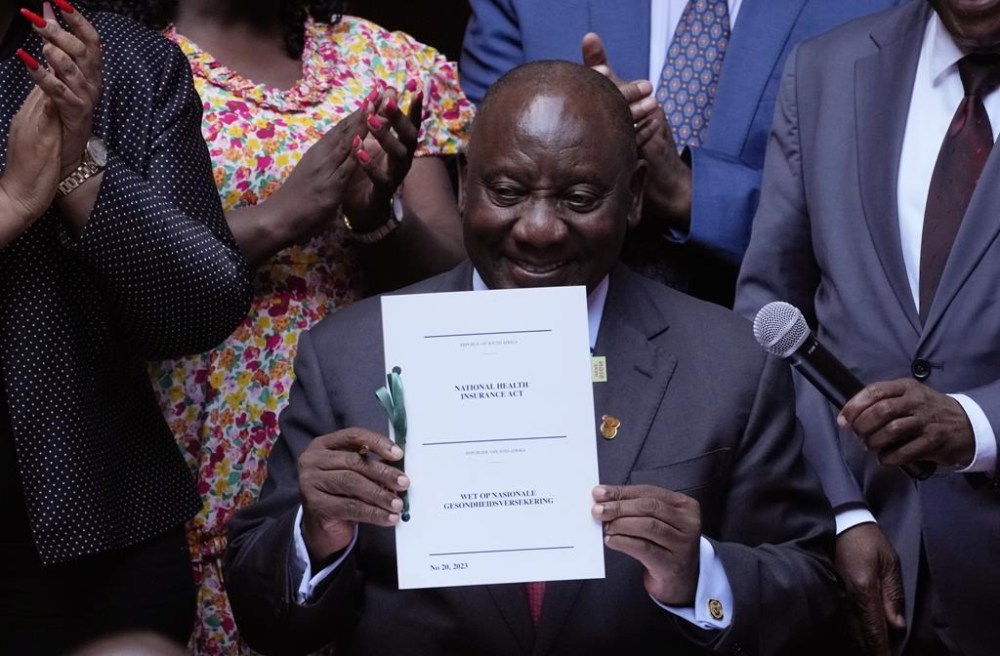A new South Africa health law aims at deep inequality, but critics say they’ll challenge it
Advertisement
Read this article for free:
or
Already have an account? Log in here »
To continue reading, please subscribe:
Monthly Digital Subscription
$1 per week for 24 weeks*
- Enjoy unlimited reading on winnipegfreepress.com
- Read the E-Edition, our digital replica newspaper
- Access News Break, our award-winning app
- Play interactive puzzles
*Billed as $4.00 plus GST every four weeks. After 24 weeks, price increases to the regular rate of $19.00 plus GST every four weeks. Offer available to new and qualified returning subscribers only. Cancel any time.
Monthly Digital Subscription
$4.75/week*
- Enjoy unlimited reading on winnipegfreepress.com
- Read the E-Edition, our digital replica newspaper
- Access News Break, our award-winning app
- Play interactive puzzles
*Billed as $19 plus GST every four weeks. Cancel any time.
To continue reading, please subscribe:
Add Free Press access to your Brandon Sun subscription for only an additional
$1 for the first 4 weeks*
*Your next subscription payment will increase by $1.00 and you will be charged $16.99 plus GST for four weeks. After four weeks, your payment will increase to $23.99 plus GST every four weeks.
Read unlimited articles for free today:
or
Already have an account? Log in here »
Hey there, time traveller!
This article was published 15/05/2024 (531 days ago), so information in it may no longer be current.
JOHANNESBURG (AP) — South African President Cyril Ramaphosa on Wednesday signed into law a bill that aims to overhaul the healthcare system to address deep inequality, but it faces legal challenges from critics.
The law introduces what is known as National Health Insurance, which will provide funds for all South Africans to access private healthcare. Currently, 80% of the population relies on strained state-run public health services while about 16% has access to private healthcare through medical aid plans.
The country’s unemployment rate is 32.9%, with most of the Black majority population unable to afford private healthcare. Public health facilities often have long lines and medicine shortages.

According to Ramaphosa, the aim of the National Health Insurance is to provide access to quality health care for all and integrate the health system.
“In its essence, the National Health Insurance is a commitment to eradicate the stark inequalities that have long determined who in our country receives adequate healthcare and who suffers from neglect,” he said.
Opposition parties accuse Ramaphosa of using the law as a campaign strategy by announcing it nearly two weeks before much anticipated elections.
The May 29 vote is expected to be one of the country’s most highly contested. Ramaphosa’s ruling African National Congress faces the possibility of receiving less than 50% of the vote for the first time since it came into power in 1994.
Concerns have also been raised about the affordability of the law and possible tax increases to fund it.
The official opposition Democratic Alliance said Wednesday it would legally challenge the new law.
Civil society group AfriForum has also announced plans to challenge the constitutionality of the law, while some business forums have described it as unworkable and unaffordable.
The Health Funders Association, an organization representing stakeholders involved in funding private healthcare, said it would take significant time before the plan comes into effect.
“There will be no immediate impact on medical scheme benefits and contributions, nor any tax changes. The HFA is well prepared to defend the rights of medical scheme members and all South Africans to choose privately funded healthcare, where necessary,” spokesman Craig Comrie said.
Others have welcomed the law.
Dr. Cedric Sihlangu, general secretary of the South African Medical Association Trade Union, said it has long advocated for reforms that “significantly improve patient care and access to health services.”
___
AP Africa news: https://apnews.com/hub/africa

